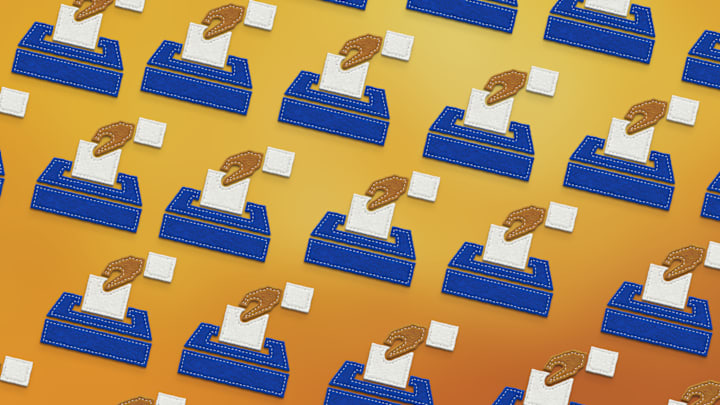If you’re a voter in the United States, you may be formulating your Election Day plan. When’s the best time to go to the polls so you don’t miss any recurring Tuesday obligations while still avoiding long lines? It’s inconvenient for many now, but it turns out choosing a Tuesday in November as Election Day was all about making things easy for farmers.
- How did the first presidential elections work?
- Why the first Tuesday in November?
- Modern Election Days
How did the first presidential elections work?
In the United States, citizens vote for the president, but it’s actually a group of electors who use those results to vote and ultimately elect the commander-in-chief. The original Constitution gave Congress the power to decide when presidential electors must cast their votes.
In 1792, Congress decided that electors would vote for president and vice president on the first Wednesday in December. But before electors vote, the population must vote—so states were allowed to hold elections on any of the 34 days leading up to that Wednesday. Most opted for early November.
But having elections occur over an extended period of time led to concern about election fraud. People could conceivably cross state lines and vote multiple times, particularly as travel became easier [PDF]. Another worry was that early results in some states might affect how people in other states voted.
Why the first Tuesday in November?
In response to those concerns, an 1845 law was passed that created one single Election Day throughout the United States. All subsequent presidential elections would be held on “the Tuesday next after the first Monday in the month of November” [PDF]. Seems kind of wordy and specific, but it’s for good reason. (A good mid-19th century reason, at least.)

At the time, most eligible voters were farmers who had to travel to the polls for at least a day. The spring and early summer months were inconvenient because they comprised the crop-planting season. Late summer and early fall were spent harvesting. November was late enough in the year to not interfere with the harvest, but early enough that voters could avoid traveling through freezing temperatures and snowstorms.
As for Tuesday being the chosen day of the week, farming was another limiting factor. Farmers sold their crops on Wednesdays. There were also religious obligations to consider. Most eligible voters were Christian and couldn’t spend Sunday traveling to the polls because they were at church. The law also needed to ensure that Election Day wasn’t November 1, the Christian holiday All Saints’ Day. Plus, merchants spent the first day of the month bookkeeping. That explains the “Tuesday next after the first Monday” wording.
Modern Election Days
In 2024, most of those 19th-century reasons aren’t as compelling. In an effort to improve voter turnout, there have been proposals for Election Day to fall on a weekend or become a federal holiday. They haven’t ever moved past the committee phase.

For people with other commitments on Election Day, there’s early voting. Absentee voting has been around since the Civil War, when soldiers could send their ballots to family members to submit. States eventually formalized the practice of mailing in ballots (which were initially only available to those in the military), with each state setting its own rules. In the upcoming November 2024 general election, 47 states and Washington, D.C. will offer in-person early voting, according to the Center for Election Innovation and Research, which notes that “These 47 states account for nearly 97 [percent] of the current citizen voting age population.”
So although “the Tuesday next after the first Monday in the month of November” remains Election Day according to the law books, many people can vote early (and 28 states require employers to give their employees time off to cast their ballots). In the 2022 election, 50 percent of votes were cast early, and an even higher percentage is expected this year.
Read More About Politics:
